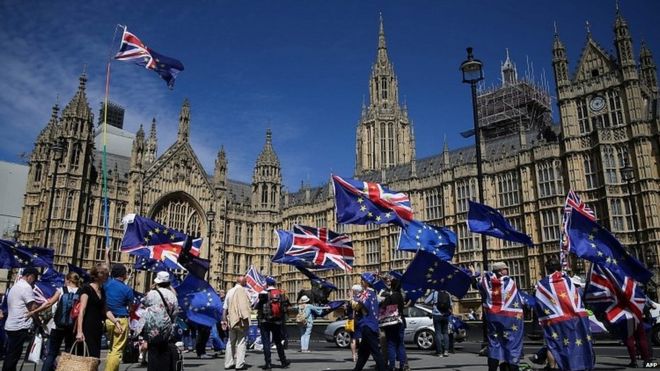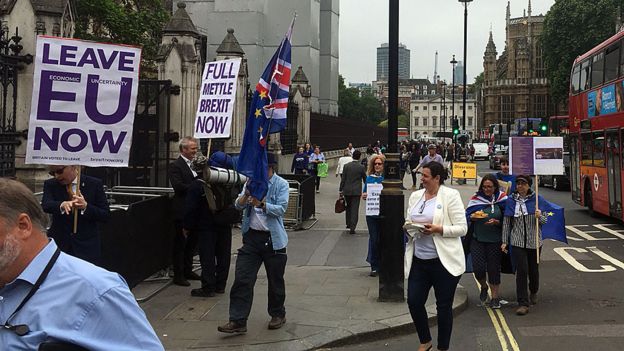Brexit: Davis appeals to EU Withdrawal Bill vote rebels

David Davis has told Conservative MPs the UK's whole approach to negotiations with the EU risks being undermined by amendments to its flagship Brexit bill.
The Commons will vote later on whether to give MPs a decisive say on any final deal struck with the EU in the autumn.
Mr Davis said Parliament would be involved in the process but could not undo the 2016 EU referendum.
The government was hit by a resignation ahead of the vote, with Phillip Lee saying Parliament was being sidelined.
The justice minister announced he was quitting over the Brexit strategy being pursued and that he could not support "how our country's exit from the EU looks set to be delivered".
MPs are gearing up for two days of votes on changes made by the House of Lords to the EU Withdrawal Bill. The most tightly-contested amendment is expected to be a call for Parliament to decide what happens next if it does not like the UK-EU Brexit deal.
Mr Lee cited the government's opposition to this position in a statement on his website, saying it "breaches such fundamental principles of human rights and Parliamentary sovereignty".
Theresa May has warned that any defeats on this key piece of legislation would send the wrong message to Brussels.
BBC political editor Laura Kuenssberg said the numbers were still "rather dicey" for the so-called meaningful vote amendment.
One of the potential rebels, former Attorney General Dominic Grieve, has tabled his own amendment which he said offered a "solution which would satisfy everyone" saying he "might well" vote against the government if it was rejected.
Speaking on BBC Radio 4's Today programme, Mr Davis said a Parliamentary vote on the Brexit deal did not give "the ability to reverse the decision of the referendum".
Asked what would happen if MPs rejected the deal, he said there would be no time to restart negotiations, with the UK leaving the EU in March 2019.
"If they throw it out, well they throw it out," he said.

A showdown over customs seems to have been averted after a compromise amendment was accepted by the government - which means it has agreed to report to Parliament by October on efforts to negotiate a "customs arrangement" with the EU after Brexit.
The fallback position has won the backing of a cross-section of leading Tory MPs on either side of the Brexit argument, avoiding for now a showdown over calls - backed by the House of Lords earlier this year - for the UK to remain in a fully-fledged customs union with the EU after it leaves.
Mr Davis said a "great deal of progress" had been made in negotiations, saying he was expecting both a withdrawal agreement and the "substance" of the UK and EU's future relationship to be finalised in October.
He also described as "nonsense" reports he threatened to resign over the wording of last week's "backstop" plan to avoid border checks in Northern Ireland.
Comments
Post a Comment